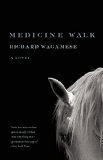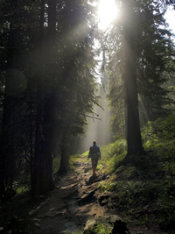Summary | Excerpt | Reviews | Beyond the Book | Read-Alikes | Genres & Themes | Author Bio

Critics' Opinion:
Readers' Opinion:
First Published:
May 2015, 256 pages
Paperback:
May 2016, 256 pages
 Book Reviewed by:
Book Reviewed by:
Kim Kovacs
Buy This Book
This article relates to Medicine Walk
Many cultures have a tradition of using a solitary walk to help individuals achieve their inner goals, whether it be deepening their spirituality, finding insights to problems, or helping determine a path in life. Some Native American tribes in particular, encourage adolescents to go on a "medicine walk" to obtain inner peace and establish a closer relationship with nature.
 At its simplest, a medicine walk is open time and unplanned travel in a natural place – aimless wandering. Most who advocate this type of activity recommend that it take at least one full day, occur as far away from humanity as possible, and often endorse fasting to help improve personal clarity. It should be approached without having any set goal other than to observe the world, and should be done in silence, alone, and without any type of electronics present (not even a wristwatch); there should be no agenda or set route. It is an opportunity to let go of the concerns of daily life and focus on one's immediate surroundings – a time set aside when one's mind can transcend planning for the future or worrying about the past and just "be."
At its simplest, a medicine walk is open time and unplanned travel in a natural place – aimless wandering. Most who advocate this type of activity recommend that it take at least one full day, occur as far away from humanity as possible, and often endorse fasting to help improve personal clarity. It should be approached without having any set goal other than to observe the world, and should be done in silence, alone, and without any type of electronics present (not even a wristwatch); there should be no agenda or set route. It is an opportunity to let go of the concerns of daily life and focus on one's immediate surroundings – a time set aside when one's mind can transcend planning for the future or worrying about the past and just "be."
There are many reasons for undertaking a medicine walk. It can be an educational experience as one discovers more about nature through observation. Participants are encouraged to not only walk but also to stay still at times, watching a particular tree or stream or other natural feature that calls to them to develop a deeper understanding of the natural world (for example, what birds or fish are present, what insects, what plants; how do they interact and what can you learn from that?).
Some also consider the medicine walk highly therapeutic, particularly in this day and age when it is difficult to lay aside the cares of the world. Time spent in the appreciation of nature has a healing effect on the psyche, allowing the individual to better put problems in perspective. This realignment of the self to the natural world can also nurture the soul, making one feel closer to the divine and thereby developing a renewed sense of spirituality.
The most common reason for taking a medicine walk, though, tends to be a desire for insight into one's life, whether that be an answer to a specific question or a longing for direction. This can be more challenging to achieve, however, since only in letting go of conscious thought about these topics can deeper insight be obtained.
Regardless of the ultimate purpose for going on a medicine walk, it is important to process one's experiences upon return. It's generally recommended that insights be recorded in a journal. The School of Lost Borders, which sponsors medicine walks and vision quests for teenagers, suggests contemplating this list of questions to help analyze what one learned over the course of the journey:
Picture of medicine walk from Reweavingtheworld.com
Filed under Nature and the Environment
![]() This "beyond the book article" relates to Medicine Walk. It originally ran in June 2015 and has been updated for the
May 2016 paperback edition.
Go to magazine.
This "beyond the book article" relates to Medicine Walk. It originally ran in June 2015 and has been updated for the
May 2016 paperback edition.
Go to magazine.





The House on Biscayne Bay
by Chanel Cleeton
As death stalks a gothic mansion in Miami, the lives of two women intertwine as the past and present collide.

The Flower Sisters
by Michelle Collins Anderson
From the new Fannie Flagg of the Ozarks, a richly-woven story of family, forgiveness, and reinvention.

The Funeral Cryer by Wenyan Lu
Debut novelist Wenyan Lu brings us this witty yet profound story about one woman's midlife reawakening in contemporary rural China.
Your guide toexceptional books
BookBrowse seeks out and recommends the best in contemporary fiction and nonfiction—books that not only engage and entertain but also deepen our understanding of ourselves and the world around us.